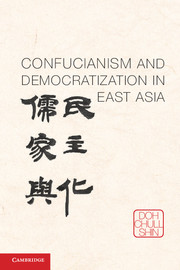9 - Reassessing the Confucian Asian Values Debate
from Part v - Final Thoughts
Published online by Cambridge University Press: 05 June 2012
Summary
Today, historically Confucian East Asia represents a region of democratic underdevelopment. Are Confucian cultural legacies the force preventing the powerful third wave of global democratization from sweeping most countries in Confucian East Asia? Have these legacies also prevented new and old democracies in the region from becoming well-functioning liberal democracies, as proponents of the Asian Values Thesis have argued? The research reported on in this book sought to explore these and other related questions concerning the prevalence and dissemination of Confucian legacies, as well as their connection to democratic and authoritarian politics from the perspective of the mass citizenry.
To this end, I began with a broad conceptualization of Confucianism and democracy, describing each as a multidimensional phenomenon. Defining Confucianism as a system of political and social ethics, I considered the proper modes of both social living and political governance that Confucianism advocates for the achievement of datong shehui, a community of grand harmony. Furthermore, I regarded Confucianism as a phenomenon covering the region of East Asia identified as historically Confucian East Asia and rejected the equation of Confucian values with Asian values, which the Asian Values Thesis has often implied.
- Type
- Chapter
- Information
- Confucianism and Democratization in East Asia , pp. 317 - 334Publisher: Cambridge University PressPrint publication year: 2011

